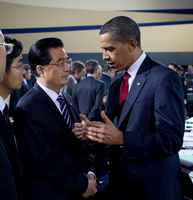Last month, Republicans bashed President Barack Obama for not meeting with the Dalai Lama during his swing through Washington, portraying the president as caving to pressure from Chinese "tyrants" who hold trillions of dollars in U.S. debt and view the Tibetan spiritual leader as Public Enemy No. 1.
"You can bet the Chinese are using their influence in ways we do not even know about," warned Rep. Dana Rohrabacher, the Republican co-chair of the Congressional Tibet Caucus. "This goes way beyond the Dalai Lama. The U.S. has permitted China to have a one-way free trade policy for decades, and now we are not only suffering the serious economic damage caused by that policy, we are finding ourselves politically vulnerable to a regime that is the world's worst human rights abuser."
The rhetorical bombshell blended one part protectionism and one part human rights activism with an overarching hawkishness that sees a rising China as an inevitable threat to the United States. It also showed the lingering mistrust that exists between the two countries -- economic giants that don't see eye-to-eye on human rights or democratic ideals, but realize that their interactions now determine the outcome of a host of high-profile issues, including the global economy, climate change and regional security.

